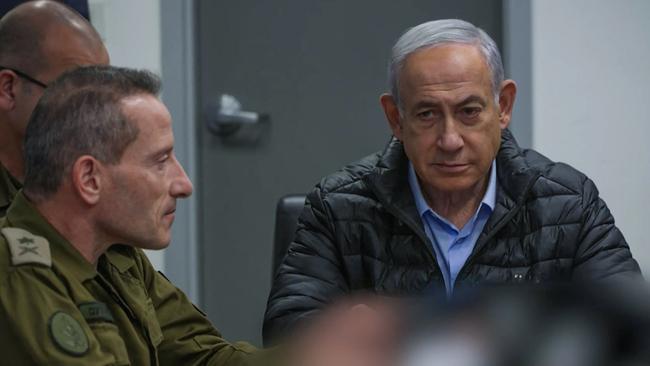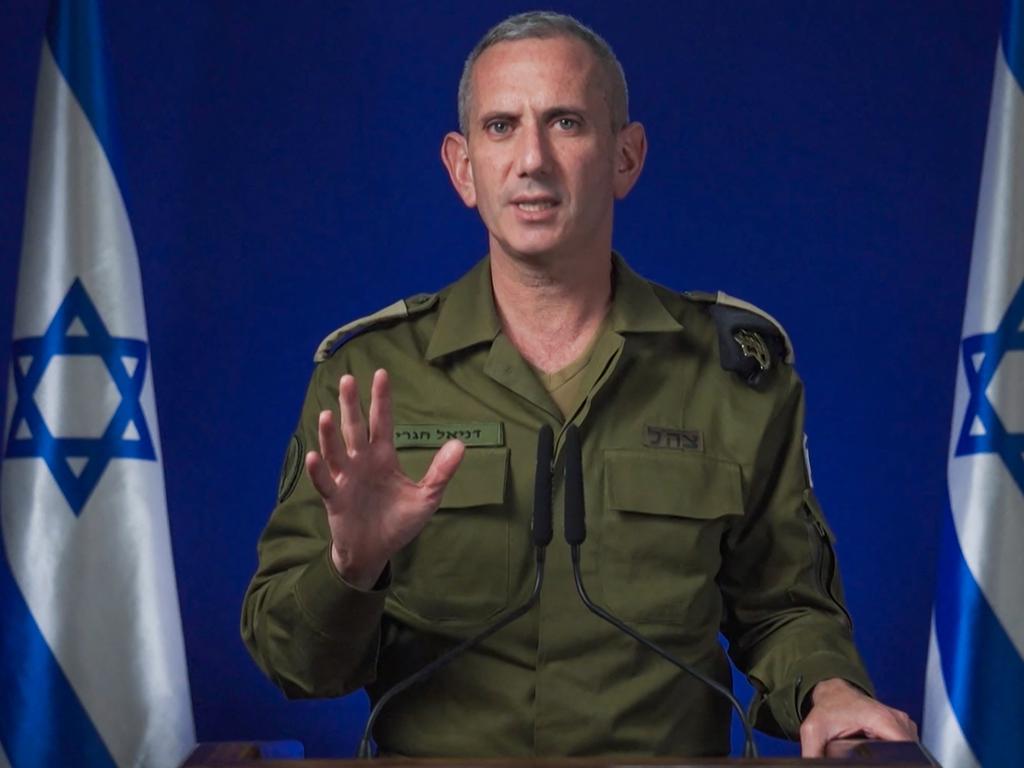Israel expands war in Middle East as it strikes back at Iran
Israel limited its strikes to military facilities rather than energy or nuclear sites, giving Iran an excuse not to respond, now the two countries have attacked each other twice.

Israel has struck back at Iran, delivering a much-threatened response to this month’s 180-missile attack and further expanding the regional hostilities that have spiralled out of the year-long war in Gaza.
The attacks played out in several waves over multiple hours, then wrapped up before daybreak. Israel said it had hit military targets in a number of areas, including missile manufacturing facilities and air-defence sites, in an assault that appeared calibrated to avoid provoking heavy retaliation.
Iran, which cancelled flights until 9am local time Saturday, had threatened to retaliate forcibly if its nuclear or oil infrastructure was attacked. The US had urged Israel not to hit those targets, and governments around the world had cautioned against further escalation in the midst of concern that the violence could spin out of control.

Iran’s air-defence authorities said the attacks targeted military centres in the province of Tehran, which includes the capital, as well as the Khuzestan and Ilam provinces, along Iran’s western border with Iraq. They were still investigating the full impact but said limited damage had been done. Iran also said Saturday that four of its soldiers died in the Israeli attacks.
“From what we know now, this is the best-case scenario in terms of keeping this round contained, given Israel seems to have limited its strikes to military targets rather than nuclear or oil infrastructure,” said Dalia Dassa Kaye, a senior political scientist at the University of California, Los Angeles, and former director of the Center for Middle East Public Policy at Rand. “This gives Iran an exit ramp if it’s looking for one. But we’re still in a different place, because Israel and Iran are now in a direct and open conflict.” The U.S. was informed by Israel hours ahead of the attack and didn’t participate, American officials said. Prime Minister Benjamin Netanyahu discussed Israel’s plans for the strike with President Biden on a call earlier this month, a U.S. official said. After the attack began, Defense Secretary Lloyd Austin spoke briefly by phone with Israeli Defense Minister Yoav Gallant, U.S. officials said.

“If Iran chooses to respond once again, we will be ready, and there will be consequences for Iran once again,” a senior U.S. administration official said. “However, we do not want to see that happen. This should be the end of this direct exchange of fire between Israel and Iran.” Iran also got advance notice hours before the attack, a warning from Israel that was passed along by several Arab and European countries, according to people familiar with the matter. They said the warning outlined what Israel intended to target and indicated that if Iran planned to retaliate, subsequent attacks would be more powerful. Israel didn’t immediately respond to a request for comment. The Iranian Mission to the United Nations in New York couldn’t be reached.
A woman in central Tehran told The Wall Street Journal that she woke to the sound of continuous explosions Saturday. “My heart is jumping out of my chest,” she said. Iranian air-defence authorities said their systems were firing in three locations around the capital. The country earlier closed its airspace for several hours, according to a notice to pilots.
Iran struck Israel on Oct. 1 to avenge the killings of the Hamas political leader Ismail Haniyeh in Tehran, and the Hezbollah leader Hassan Nasrallah in Beirut, launching about 180 ballistic missiles. In recent conversations with Arab governments, Iran’s foreign minister said his country doesn’t want a wider war and suggested Tehran could absorb an Israeli retaliatory strike without escalating if it targeted military sites rather than sensitive oil or nuclear facilities, Arab officials said.
The strikes and threats marked the latest expansion of the fighting that began a year ago in Gaza, sparked by last year’s Hamas-led October 7 attack on southern Israel that left about 1,200 dead. Israel and Iran, after fighting a long war through proxies, have now exchanged fire directly twice this year.
Israel has also launched a major military campaign in Lebanon, following up a year of back-and-forth exchanges of fire by sending troops into the country and carrying out more than 3,000 airstrikes in the past month. That has left more than 2,500 dead since the beginning of the conflict, according to Lebanese health authorities.
Fighting has escalated in Gaza with a major Israeli operation in the northern part of the enclave, while Iran-linked militias in Yemen and Iraq continue to strike at Israel, the U.S. and shipping in the Red Sea area. More than 42,000 people have been killed in Gaza since Oct. 7 last year, according to Palestinian health officials, who don’t say how many were combatants.
The violence has spread markedly in the region since Iran attacked Israel directly for the first time ever in April, sending more than 300 drones and missiles in a barrage that was largely shot down by Israel and its allies. Israel replied with a pinpoint strike on an air-defence radar site in Iran.
Iran’s most recent strike at the start of this month, like the earlier one in April, was aimed at military and security facilities and did little damage. U.S. warships helped shoot down several of the ballistic missiles intended for Israel. But many missiles got through Israel’s air defences, raising concern about the likely damage if they had been targeted at population centres.
Netanyahu warned Iran that it had made a “big mistake” in launching the attack and would pay for it.
Among the military assets Israel targeted were Iranian aerial-defence systems, including Russian-made S-300 surface-to-air batteries, according to an Israeli official, who said Israel destroyed all four of the country’s S-300 batteries.
Netanyahu and Gallant were at Israeli military headquarters in Tel Aviv early Saturday overseeing the strikes from an underground bunker, the prime minister’s office said. Israel’s military said that all of its planes had returned safely and that they now had more freedom to operate in Iran as a result of the attacks.
“The Gaza war has brought the Israel-Iran conflict out of the shadows,” said Kaye from UCLA.
— Summer Said, Jared Malsin and Aresu Eqbali contributed to this article.
The Wall Street Journal





To join the conversation, please log in. Don't have an account? Register
Join the conversation, you are commenting as Logout